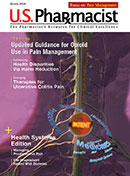A recent study conducted by the University of Minnesota Medical School that was published in the journal Cell Reports reveals that some individuals who received a messenger RNA (mRNA) vaccine for COVID-19 have greater immune responses compared with others.
While the vaccine induces robust immune responses against the virus in almost everyone, data show that those who were previously infected with the virus have even greater immune responses after vaccination compared with fully vaccinated persons who never had COVID-19.
The goal of this study was to characterize the secondary immune responses of memory B cell (MBC) populations generated by an mRNA vaccine or SARS-CoV-2 infection. In the study, researchers discovered that patients with a previous SARS-CoV-2 infection had a large number of spike-specific MBCs before vaccination, and after the first dose of an mRNA vaccine, they had a significant boost in spike-specific MBCs—but not after the second dose.
They also noted that despite the weaker response to the second mRNA dose, patients with a previous SARS-CoV-2 infection still ended up with a larger number of spike-specific MBCs than fully vaccinated individuals who never had the virus, and the spike-specific MBCs in individuals with a previous SARS-CoV-2 infection bound more tightly to the spike protein of the virus compared with the MBCs induced in uninfected people after a single mRNA vaccination.
The study authors concluded that their results suggest that infection-induced primary MBCs have undergone more affinity maturation than vaccine-induced primary MBCs and produce more robust secondary responses. They also noted that their results shed light on the immunologic status of SARS-CoV-2–naive and SARS-CoV-2–infected persons up to 3 months after completion of the two-dose vaccination series.
In a story on the University of Minnesota Medical School website, Marc Jenkins, PhD, a professor and director of the Center for Immunology at the University of Minnesota Medical School and one of the authors of the study, stated, "Memory B cells are capable of rapid antibody production after re-infection, which is critical for immunity as antibody levels decline. Our research shows that fully vaccinated people who had a prior SARS-CoV-2 infection end up with an even larger number of memory B cells than fully vaccinated people who have not had an infection."
Dr. Jenkins added, "Our results show the benefit that people who had a SARS-CoV-2 infection get from vaccination and predict that this group may have fewer breakthrough infections. It's unclear how many memory B cells are needed for protection against infection, our data also indicates that people who had a previous infection and were then fully vaccinated are the least likely group to need a third—or booster—shot."
As a result of their findings, the research team is examining memory B cell formation in fully vaccinated patients with immunosuppressed systems.
The content contained in this article is for informational purposes only. The content is not intended to be a substitute for professional advice. Reliance on any information provided in this article is solely at your own risk.
« Click here to return to mRNA Technology Update.
Published October 13, 2021






